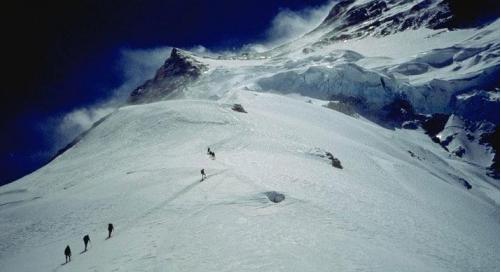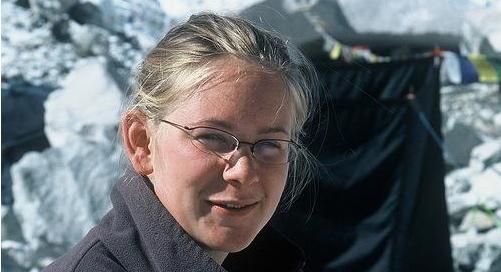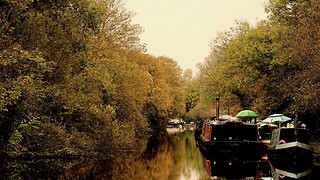Ain’t no mountain high enough
As she prepares for her next ascent, writes about the trials of mountain climbing
As a 21 year-old girl and a History of Art student at Peterhouse, perhaps I make an unlikely mountaineer. Certainly, in comparison to the number of female rock climbers around today, there are surprisingly few female high-altitude mountaineers. I don’t see why this should be the case; in my experience climbing a big mountain is more a question of stamina and determination than of brute strength and machismo. I hope that my expedition to the Himalayas this Easter will encourage other British women to have a go at mountaineering, to venture above 8000m amongst some of the most spectacular scenery imaginable.
 The peak I will be attempting is called Cho Oyu, the ‘Turquoise Goddess’, and lies on the border between Nepal and Tibet. It was first climbed in 1954, from the Tibetan side by an Austrian team led by Herbert Tichy. My expedition will follow this same route, living at Advance Base Camp and putting in three further camps on the mountain before finally making a push for the summit. The whole trip will take four or five weeks, giving us ample time to acclimatise as we move up the mountain.
The peak I will be attempting is called Cho Oyu, the ‘Turquoise Goddess’, and lies on the border between Nepal and Tibet. It was first climbed in 1954, from the Tibetan side by an Austrian team led by Herbert Tichy. My expedition will follow this same route, living at Advance Base Camp and putting in three further camps on the mountain before finally making a push for the summit. The whole trip will take four or five weeks, giving us ample time to acclimatise as we move up the mountain.
 Acclimatization is absolutely critical on a mountain of this size, especially as I will be climbing without supplementary oxygen. Areas above about 7600m (the altitude of Camp 3 on Cho Oyu) are known as the ‘death zone’ because the paucity of oxygen in the air at that altitude causes the body gradually to deteriorate. Not only that, but temperatures high on the mountain will commonly fall to -30°C. I’m very fortunate to have been given lots of mountain clothing by Berghaus (Ireland), as well as some glacier glasses from The Norville Group, which will stop me getting snow-blindness. It will be an expensive trip and I am especially grateful to the Gordon Foundation for their generous travel grant. I would still welcome any further sponsorship!
Acclimatization is absolutely critical on a mountain of this size, especially as I will be climbing without supplementary oxygen. Areas above about 7600m (the altitude of Camp 3 on Cho Oyu) are known as the ‘death zone’ because the paucity of oxygen in the air at that altitude causes the body gradually to deteriorate. Not only that, but temperatures high on the mountain will commonly fall to -30°C. I’m very fortunate to have been given lots of mountain clothing by Berghaus (Ireland), as well as some glacier glasses from The Norville Group, which will stop me getting snow-blindness. It will be an expensive trip and I am especially grateful to the Gordon Foundation for their generous travel grant. I would still welcome any further sponsorship!
Preparation and planning is half the battle on an expedition like this; gathering together all the clothing, climbing gear, camping stuff, medicines and food that you’ll need, and then trying to reduce the weight so that you can carry it all. I’m doing the expedition as part of a small team of seven people and we’ll be unsupported; that is, carrying our own gear, putting up our tents, cooking our food and so on. It’s great fun to live independently in the mountains, life is much more straightforward: all you have to do is eat, sleep and climb.
There are only fourteen mountains over 8000m high in the world and I have dreamt of climbing one of them since I was ten. That was when, on a trekking holiday in Northern Pakistan with my family, I saw the 8125m peak of Nanga Parbat, the ‘Killer Mountain’. As well as teaching me to love being in the mountains, that holiday made me appreciate the satisfaction of hard physical exercise. A concession was made for my younger brother, then only seven, in the form of a donkey to carry him, but I was firmly encouraged to walk.
Since that trek in Pakistan I have spent as much time as possible in the mountains, during school and university holidays. I gradually built up the altitude; climbing mountains like Mt Blanc, Mt Kilimanjaro in Tanzania, and Imja Tse, 6189m, in Nepal. Most recently I have climbed a 7000m volcano called Ojos del Salado, which is in the middle of the Chilean desert. It was the first time I’ve climbed a snow-capped mountain and then been able to descend and have a hot bath in a natural thermal pool.
Sadly there will be no thermal pools on Cho Oyu, though I’m told it’s possible to make a sauna in a toilet tent (having moved the tent away from the toilet hole first). Like most long expeditions, this trip will probably fairly smelly and uncomfortable, certainly it will be extremely hard work. That is part of the appeal of mountaineering; the joy of seeing all your efforts pay off as you reach the summit and, more importantly, as you arrive home safely afterwards. I also love the sense of peace you get on a mountain; the absolute silence that only exists far, far away from civilization.
Mountaineering is, perhaps, a selfish activity. The only reason to venture so high above the clouds is because you want to. I’m very aware of this, and would like to take the opportunity to do something useful with the expedition; to fundraise for a certain charity, appropriately called Moving Mountains. I have worked with them in the past, helping to build a hydro-electric scheme for a remote village in the Nepalese Himalayas. I would be enormously grateful to anyone who would like to sponsor me as the youngest British woman to attempt Cho Oyu.
www.justgiving.com/ellichooyu
Elli Pirkis
 Science / Who gets to stay cool in Cambridge?7 September 2025
Science / Who gets to stay cool in Cambridge?7 September 2025 News / Tompkins Table 2025: Trinity widens gap on Christ’s19 August 2025
News / Tompkins Table 2025: Trinity widens gap on Christ’s19 August 2025 News / Government allows Gazan students to take up university places6 September 2025
News / Government allows Gazan students to take up university places6 September 2025 Features / Meet the Cambridge students whose names live up to their degree9 September 2025
Features / Meet the Cambridge students whose names live up to their degree9 September 2025 News / Two pro-Palestine demonstrations held in past week8 September 2025
News / Two pro-Palestine demonstrations held in past week8 September 2025









